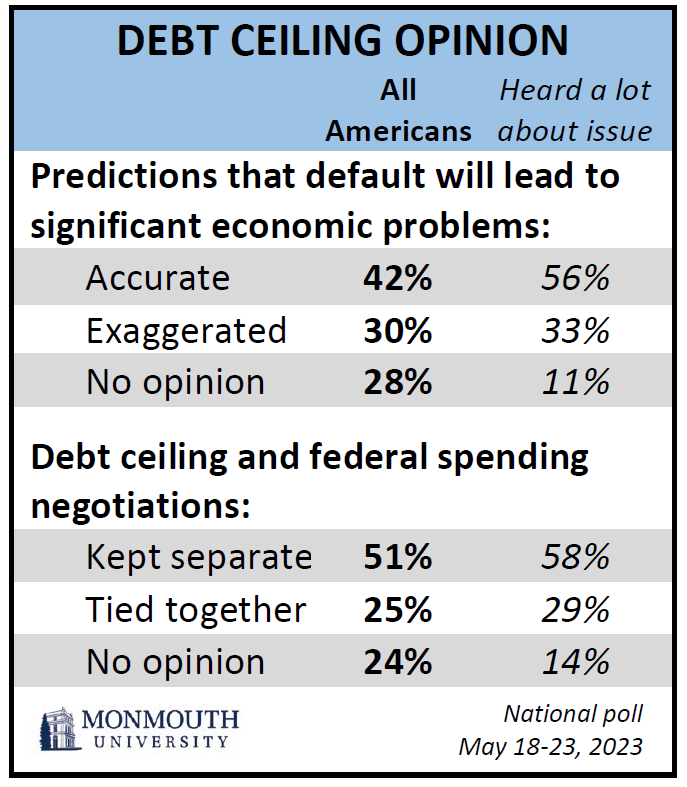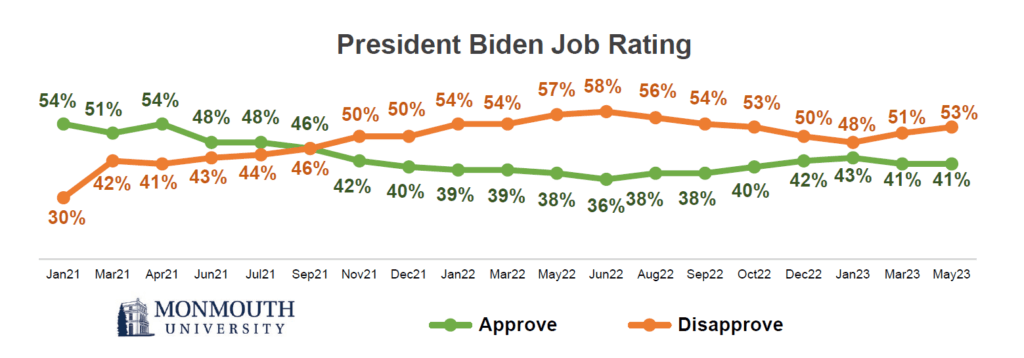West Long Branch, NJ – Half of Americans say the debt ceiling issue should be dealt with cleanly, while just 1 in 4 want to tie it to federal spending negotiations, according to the Monmouth (“Mon-muth”) University Poll. A plurality agrees with predictions that the country will suffer significant economic problems if the debt ceiling is not raised – a view that increases to a clear majority among those who have been paying a lot of attention to the issue. The public holds generally negative views of how President Joe Biden and both the Democrats and Republicans in Congress have handled the debt limit issue. For Biden, this rating is slightly worse than his overall job score.
Just under half (45%) of the public has heard a lot about the current federal debt ceiling debate, 40% have heard a little, and 15% have heard nothing at all. Half (50%) of American adults feel they have a lot of understanding about what raising, or not raising, the debt ceiling would mean for the U.S. economy. There are no significant partisan differences in these awareness items.

Some people say the country will suffer significant economic problems if the debt ceiling is not raised. More Americans say these expectations are accurate (42%) than believe they are exaggerated (30%), although 28% have no opinion on this. Among those who have heard a lot about the current debt limit debate, a clear majority of 56% say predictions of economic turmoil are accurate while 33% say they are exaggerated. Overall, Democrats are more likely to say that expectations of economic problems from default are accurate (58%) rather than exaggerated (15%), while Republicans are more likely to have a contrary opinion (47% exaggerated and 26% accurate).
Just 1 in 4 (25%) Americans think the debt ceiling should be tied to negotiations over spending on federal programs, while half (51%) say the two issues should be dealt with separately. Among those who have heard a lot about the current debate, the number who say the two issues should be dealt with separately rises slightly to 58%. A clear majority (65%) of Democrats say the debt ceiling should be handled on its own. Republicans are evenly divided between handling the debt limit separately (37%) and tying it to federal spending negotiations (37%).
“About half the public feels they have a handle on what the consequences of a federal default would mean, and most of them want a clean deal on the debt ceiling,” said Patrick Murray, director of the independent Monmouth University Polling Institute.
The public generally has a negative view of how all the players involved have handled the debt ceiling issue, including Biden (34% approve and 55% disapprove), the Democrats in Congress (32% approve and 55% disapprove), and the Republicans in Congress (29% approve and 60% disapprove). Still, Biden’s overall job rating – 41% approve and 53% disapprove – has not moved appreciably since Monmouth’s previous national poll in March (41% approve and 51% disapprove). Approval of the job Congress is doing on a whole (18%) has slipped into the teens from 23% two months ago.

In other poll findings, Vice President Kamala Harris receives a job rating of 37% approve and 52% disapprove. Just 16% of Americans say the country is going in the right direction and 74% say things have gotten off on the wrong track. While this rating has been generally negative over the past decade, the right direction number has rarely dipped into the teens. In Monmouth polling going back ten years, the record low for “right direction” was 10% in June 2022.
The Monmouth University Poll was conducted by telephone from May 18 to 23, 2023 with 981 adults in the United States. The question results in this release have a margin of error of +/- 5.6 percentage points for the full sample. The poll was conducted by the Monmouth University Polling Institute in West Long Branch, NJ.
QUESTIONS AND RESULTS
(* Some columns may not add to 100% due to rounding.)
1.Do you approve or disapprove of the job Joe Biden is doing as president?
| Trend: | May 2023 | March 2023 | Jan. 2023 | Dec. 2022 | Oct. 2022 | Sept. 2022 | Aug. 2022 | June 2022 | May 2022 | March 2022 | Jan. 2022 |
|---|---|---|---|---|---|---|---|---|---|---|---|
| Approve | 41% | 41% | 43% | 42% | 40% | 38% | 38% | 36% | 38% | 39% | 39% |
| Disapprove | 53% | 51% | 48% | 50% | 53% | 54% | 56% | 58% | 57% | 54% | 54% |
| (VOL) No opinion | 6% | 8% | 9% | 8% | 7% | 8% | 7% | 6% | 5% | 7% | 7% |
| (n) | (981) | (805) | (805) | (805) | (808) | (806) | (808) | (978) | (807) | (809) | (794) |
| Trend: Continued | Dec. 2021 | Nov. 2021 | Sept. 2021 | July 2021 | June 2021 | April 2021 | March 2021 | Jan. 2021 |
|---|---|---|---|---|---|---|---|---|
| Approve | 40% | 42% | 46% | 48% | 48% | 54% | 51% | 54% |
| Disapprove | 50% | 50% | 46% | 44% | 43% | 41% | 42% | 30% |
| (VOL) No opinion | 11% | 9% | 8% | 8% | 9% | 5% | 8% | 16% |
| (n) | (808) | (811) | (802) | (804) | (810) | (800) | (802) | (809) |
2.Do you approve or disapprove of the job Kamala Harris is doing as vice president?
| Trend: | May 2023 | March 2023 |
|---|---|---|
| Approve | 37% | 36% |
| Disapprove | 52% | 53% |
| (VOL) No opinion | 11% | 12% |
| (n) | (981) | (805) |
3.Do you approve or disapprove of the job the U.S. Congress is doing?
| Trend: | May 2023 | March 2023 | Jan. 2023 |
|---|---|---|---|
| Approve | 18% | 23% | 19% |
| Disapprove | 72% | 68% | 67% |
| (VOL) No opinion | 9% | 10% | 14% |
| (n) | (981) | (805) | (805) |
| Trend: | Dec. 2022 | Oct. 2022 | Sept. 2022 | Aug. 2022 | June 2022 | May 2022 | March 2022 | Jan. 2022 | Dec. 2021 | Nov. 2021 | Sept. 2021 | July 2021 | June 2021 | April 2021 | March 2021 | Jan. 2021 |
|---|---|---|---|---|---|---|---|---|---|---|---|---|---|---|---|---|
| Approve | 26% | 23% | 23% | 17% | 15% | 15% | 21% | 19% | 23% | 18% | 22% | 23% | 21% | 35% | 30% | 35% |
| Disapprove | 62% | 69% | 66% | 74% | 78% | 77% | 71% | 74% | 66% | 70% | 65% | 62% | 65% | 56% | 59% | 51% |
| (VOL) No opinion | 12% | 8% | 11% | 9% | 7% | 8% | 8% | 6% | 11% | 12% | 13% | 15% | 15% | 9% | 11% | 14% |
| (n) | (805) | (808) | (806) | (808) | (978) | (807) | (809) | (794) | (808) | (811) | (802) | (804) | (810) | (800) | (802) | (809) |
| Trend: Continued | Nov. 2020 | Early June 2020 | May 2020 | April 2020 | Feb. 2020 | Jan. 2020 | Dec. 2019 | Nov. 2019 | Sept. 2019 | Aug. 2019 | June 2019 | May 2019 | April 2019 | March 2019 | Jan. 2019 |
|---|---|---|---|---|---|---|---|---|---|---|---|---|---|---|---|
| Approve | 23% | 22% | 32% | 32% | 20% | 24% | 22% | 23% | 21% | 17% | 19% | 20% | 24% | 23% | 18% |
| Disapprove | 64% | 69% | 55% | 55% | 69% | 62% | 65% | 64% | 68% | 71% | 69% | 71% | 62% | 68% | 72% |
| (VOL) No opinion | 13% | 9% | 13% | 13% | 11% | 14% | 13% | 13% | 11% | 13% | 12% | 9% | 14% | 9% | 10% |
| (n) | (810) | (807) | (808) | (857) | (902) | (903) | (903) | (908) | (1,161) | (800) | (751) | (802) | (801) | (802) | (805) |
| Trend: Continued | Nov. 2018 | Aug. 2018 | June 2018 | April 2018 | March 2018 | Jan. 2018 | Dec. 2017 | Sept. 2017 | Aug. 2017 | July 2017 | May 2017 | March 2017 | Jan. 2017 |
|---|---|---|---|---|---|---|---|---|---|---|---|---|---|
| Approve | 23% | 17% | 19% | 17% | 18% | 21% | 16% | 17% | 18% | 19% | 19% | 25% | 23% |
| Disapprove | 63% | 69% | 67% | 71% | 72% | 68% | 65% | 69% | 69% | 70% | 68% | 59% | 66% |
| (VOL) No opinion | 14% | 14% | 14% | 12% | 11% | 11% | 19% | 15% | 13% | 11% | 13% | 16% | 11% |
| (n) | (802) | (805) | (806) | (803) | (803) | (806) | (806) | (1,009) | (805) | (800) | (1,002) | (801) | (801) |
| Trend: Continued | Sept. 2016* | Aug. 2016* | June 2016* | March 2016 | Jan. 2016 | Dec. 2015 | Oct. 2015 | Sept. 2015 | Aug. 2015 | July 2015 | June 2015 | April 2015 | Jan. 2015 | Dec. 2014 | July 2013 |
|---|---|---|---|---|---|---|---|---|---|---|---|---|---|---|---|
| Approve | 15% | 14% | 17% | 22% | 17% | 16% | 17% | 19% | 18% | 18% | 19% | 21% | 18% | 17% | 14% |
| Disapprove | 77% | 78% | 76% | 68% | 73% | 73% | 71% | 71% | 72% | 69% | 71% | 67% | 70% | 73% | 76% |
| (VOL) No opinion | 8% | 9% | 7% | 10% | 10% | 10% | 12% | 11% | 11% | 12% | 10% | 12% | 11% | 11% | 10% |
| (n) | (802) | (803) | (803) | (1,008) | (1,003) | (1,006) | (1,012) | (1,009) | (1,203) | (1,001) | (1,002) | (1,005) | (1,003) | (1,008) | (1,012) |
4.Would you say things in the country are going in the right direction, or have they gotten off on the wrong track?
| Trend: | May 2023 | March 2023 | Jan. 2023 |
|---|---|---|---|
| Right direction | 16% | 22% | 24% |
| Wrong track | 74% | 72% | 73% |
| (VOL) Depends | 6% | 3% | 1% |
| (VOL) Don’t know | 4% | 3% | 2% |
| (n) | (981) | (805) | (805) |
| Trend: | Dec. 2022 | Sept. 2022 | Aug. 2022 | June 2022 | May 2022 | March 2022 | Jan. 2022 | Dec. 2021 | Nov. 2021 | Sept. 2021 | July 2021 | June 2021 | April 2021 | March 2021 | Jan. 2021 |
|---|---|---|---|---|---|---|---|---|---|---|---|---|---|---|---|
| Right direction | 28% | 23% | 15% | 10% | 18% | 24% | 24% | 30% | 31% | 29% | 38% | 37% | 46% | 34% | 42% |
| Wrong track | 68% | 74% | 82% | 88% | 79% | 73% | 71% | 66% | 64% | 65% | 56% | 57% | 50% | 61% | 51% |
| (VOL) Depends | 2% | 2% | 1% | 1% | 2% | 1% | 3% | 1% | 2% | 4% | 3% | 3% | 2% | 4% | 3% |
| (VOL) Don’t know | 3% | 2% | 2% | 1% | 2% | 2% | 2% | 3% | 3% | 2% | 4% | 3% | 2% | 2% | 4% |
| (n) | (805) | (806) | (808) | (978) | (807) | (809) | (794) | (808) | (811) | (802) | (804) | (810) | (800) | (802) | (809) |
| Trend: Continued | Nov. 2020 | Early Sept. 2020 | Aug. 2020 | Late June 2020 | Early June 2020 | May 2020 | April 2020 | March 2020 | Feb. 2020 | Jan. 2020 |
|---|---|---|---|---|---|---|---|---|---|---|
| Right direction | 26% | 27% | 22% | 18% | 21% | 33% | 30% | 39% | 37% | 37% |
| Wrong track | 68% | 66% | 72% | 74% | 74% | 60% | 61% | 54% | 57% | 56% |
| (VOL) Depends | 4% | 4% | 4% | 5% | 4% | 4% | 5% | 4% | 6% | 6% |
| (VOL) Don’t know | 2% | 3% | 2% | 3% | 1% | 3% | 5% | 3% | 1% | 1% |
| (n) | (810) | (867) | (868) | (867) | (807) | (808) | (857) | (851) | (902) | (903) |
| Trend: Continued | Dec. 2019 | Nov. 2019 | Sept. 2019 | Aug. 2019 | June 2019 | May 2019 | April 2019 | March 2019 | Nov. 2018 | Aug. 2018 | June 2018 | April 2018 | March 2018 | Jan. 2018 |
|---|---|---|---|---|---|---|---|---|---|---|---|---|---|---|
| Right direction | 32% | 30% | 30% | 28% | 31% | 29% | 28% | 29% | 35% | 35% | 40% | 33% | 31% | 37% |
| Wrong track | 56% | 61% | 61% | 62% | 62% | 63% | 62% | 63% | 55% | 57% | 53% | 58% | 61% | 57% |
| (VOL) Depends | 8% | 7% | 6% | 8% | 6% | 4% | 7% | 6% | 7% | 6% | 3% | 5% | 6% | 3% |
| (VOL) Don’t know | 4% | 2% | 2% | 2% | 2% | 3% | 3% | 2% | 3% | 3% | 3% | 4% | 1% | 3% |
| (n) | (903) | (908) | (1,161) | (800) | (751) | (802) | (801) | (802) | (802) | (805) | (806) | (803) | (803) | (806) |
| Trend: Continued | Dec. 2017 | Aug. 2017 | May 2017 | March 2017 | Jan. 2017 | Aug. 2016* | Oct. 2015 | July 2015 | June 2015 | April 2015 | Dec. 2014 | July 2013 |
|---|---|---|---|---|---|---|---|---|---|---|---|---|
| Right direction | 24% | 32% | 31% | 35% | 29% | 30% | 24% | 28% | 23% | 27% | 23% | 28% |
| Wrong track | 66% | 58% | 61% | 56% | 65% | 65% | 66% | 63% | 68% | 66% | 69% | 63% |
| (VOL) Depends | 7% | 4% | 5% | 4% | 4% | 2% | 6% | 5% | 5% | 5% | 5% | 5% |
| (VOL) Don’t know | 3% | 5% | 3% | 5% | 2% | 3% | 4% | 3% | 3% | 2% | 3% | 4% |
| (n) | (806) | (805) | (1,002) | (801) | (801) | (803) | (1,012) | (1,001) | (1,002) | (1,005) | (1,008) | (1,012) |
5.How much have you read or heard about the recent debate over raising the federal debt ceiling – a lot, a little, or nothing at all?
| Response: | May 2023 |
|---|---|
| A lot | 45% |
| A little | 40% |
| Nothing at all | 15% |
| (n) | (981) |
6.How much do you feel you understand what raising, or not raising, the debt ceiling would mean for the U.S. economy? Would you say you understand this a lot, a little, or not at all?
| Response: | May 2023 |
|---|---|
| A lot | 50% |
| A little | 40% |
| Not at all | 9% |
| (VOL) Don’t know | 1% |
| (n) | (981) |
7.Some people say the country will suffer significant economic problems if the debt ceiling is not raised. Do you think these claims are accurate or are they exaggerated, or do you have no opinion on this?
| Response: | May 2023 |
|---|---|
| Accurate | 42% |
| Exaggerated | 30% |
| No opinion | 28% |
| (n) | (981) |
8.Do you approve or disapprove of the way each of the following is handling the debt ceiling issue? [ITEMS WERE ROTATED]
President Biden
| Response: | May 2023 |
|---|---|
| Approve | 34% |
| Disapprove | 55% |
| (VOL) Don’t know | 11% |
| (n) | (981) |
The Republicans in Congress
| Response: | May 2023 |
|---|---|
| Approve | 29% |
| Disapprove | 60% |
| (VOL) Don’t know | 12% |
| (n) | (981) |
The Democrats in Congress
| Response: | May 2023 |
|---|---|
| Approve | 32% |
| Disapprove | 55% |
| (VOL) Don’t know | 12% |
| (n) | (981) |
9.Do you think that raising the debt ceiling should be tied to negotiations over spending on federal programs, or should these two issues be dealt with separately, or do you have no opinion on this?
| Response: | May 2023 |
|---|---|
| Negotiations should be tied | 25% |
| Dealt with separately | 51% |
| No opinion | 24% |
| (n) | (981) |
[Q10-37 held for future release.]
Methodology
The Monmouth University Poll was sponsored and conducted by the Monmouth University Polling Institute from May 18 to 23, 2023 with a probability-based national random sample of 981 adults age 18 and older. Interviews were conducted in English, and included 352 live landline telephone interviews, 512 live cell phone interviews, and 117 online surveys via a cell phone text invitation. Telephone numbers were selected through a mix of random digit dialing and list-based sampling. Landline respondents were selected with a modified Troldahl-Carter youngest adult household screen. Interviewing services were provided by Braun Research, with sample obtained from Dynata (RDD, n= 669), Aristotle (list, n= 140) and a panel of prior Monmouth poll participants (n= 172). Monmouth is responsible for all aspects of the survey design, data weighting and analysis. The full sample is weighted for region, age, education, gender and race based on US Census information (ACS 2021 one-year survey). For results based on this sample, one can say with 95% confidence that the error attributable to sampling has a maximum margin of plus or minus 5.6 percentage points adjusted for sample design effects (1.79). Sampling error can be larger for sub-groups (see table below). In addition to sampling error, one should bear in mind that question wording and practical difficulties in conducting surveys can introduce error or bias into the findings of opinion polls.
DEMOGRAPHICS (weighted) |
| Self-Reported |
| 26% Republican |
| 44% Independent |
| 30% Democrat |
| 49% Male |
| 51% Female |
| 29% 18-34 |
| 33% 35-54 |
| 38% 55+ |
| 61% White |
| 13% Black |
| 18% Hispanic |
| 8% Asian/Other |
| 67% No degree |
| 33% 4 year degree |
Click on pdf file link below for full methodology and crosstabs by key demographic groups.




